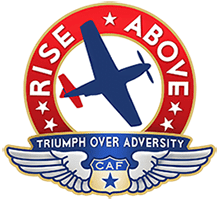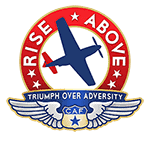
Based on the history and life lessons of the WASP.
The Six Guiding Principles© serve as the foundation for RISE ABOVE and are based on the experiences and successes of the Tuskegee Airmen and the WASP.
Read about the Six Guiding Principles, and how we can all emulate them in our lives each day.
AIM HIGH
The WASP (Women Airforce Service Pilots) were female pilots who volunteered to fly American military airplanes during World War II. At the time, it was thought that women would be incapable of flying such advanced airplanes.
When others told them it was impossible, they made their dreams come true by working hard. Aim high, and we can achieve more.
BELIEVE IN YOURSELF
More than 20,000 women applied; just 1,074 women earned the coveted silver wings, becoming official members of the WASP program.
The women signed up because it was their passion – many of them had dreamed of flying since an early age. The WASP program presented them an opportunity to serve their country while living their dream.
USE YOUR BRAIN
The WASP flew a range of missions, including towing target tugs, conducting maintenance test flights and cargo transport within the U.S. One of the main missions of the program was to ferry aircraft from factories to their points of debarkation. Between September 1942 and December 1944 women pilots of the WASP would ferry more than 12,650 aircraft.
BE READY TO GO
Training took several months, during which time the women were rigorously prepared for flying long missions through extensive cross-country flights and night flights. There was a total of 19 classes during WWII to train female cadets. After training the WASP were based at 120 air bases across the U.S.
NEVER QUIT
The WASP did not receive equal pay or benefits. Their pay did not scale; any woman who graduated received the same amount of money, no matter how advanced or complex her task. The WASP were also billed for their room and board.
The 38 women who were killed during the program could not be buried with military honors, and their bodies were shipped home at the expense of their families.
EXPECT TO WIN
Even though these women had proven themselves extremely capable, the program was shut down in 1944 amid a hail of controversy about the cost of training women pilots.
In 1977 they were granted veteran’s status 35 years after the conclusion of the War, the delay preventing many from using benefits like the GI Bill.
The WASP collectively received the Congressional Gold Medal on July 1st, 2009.

